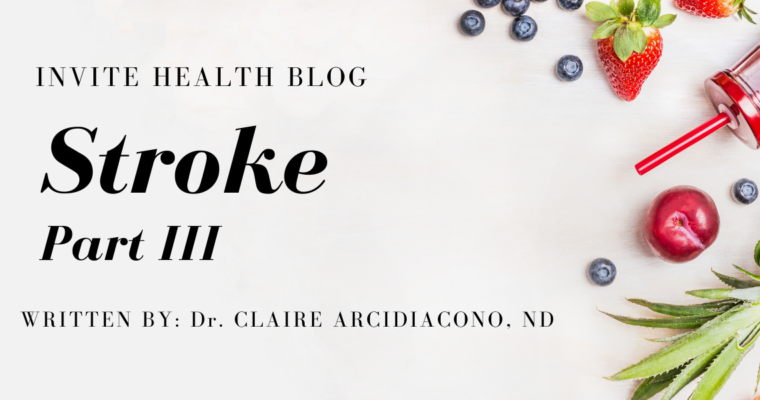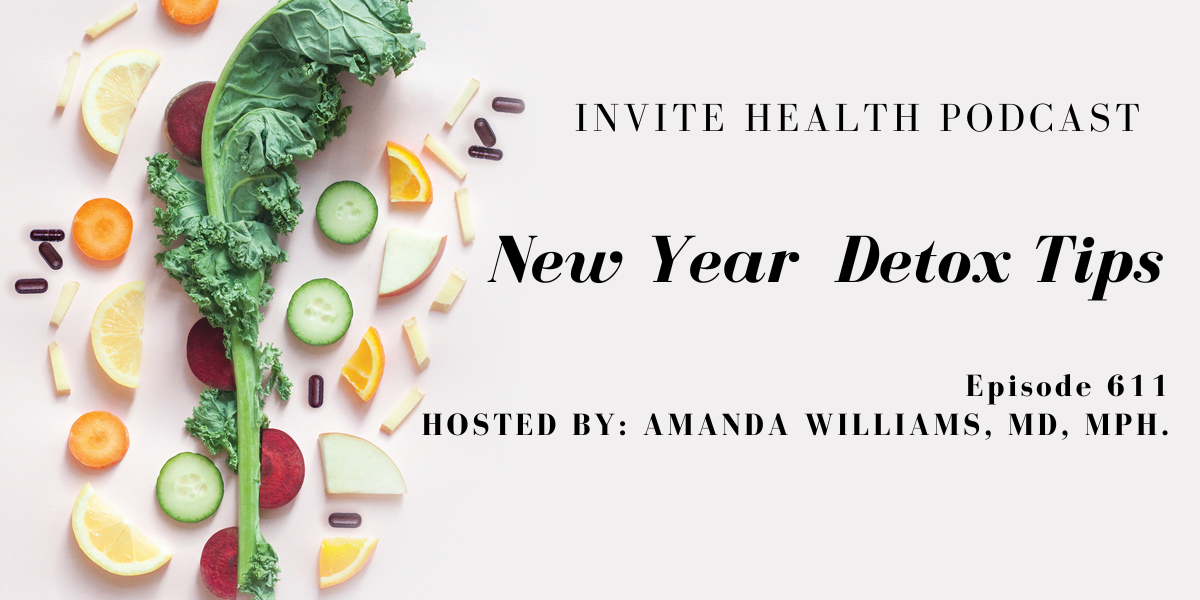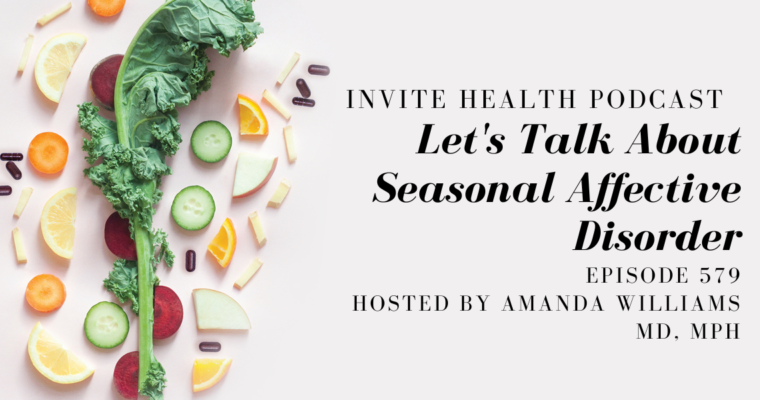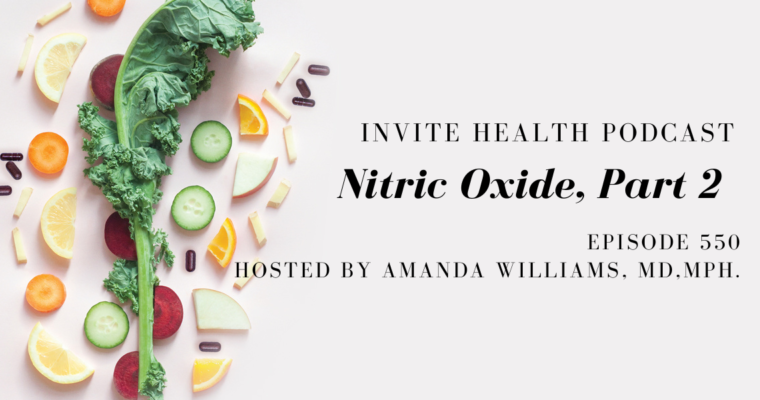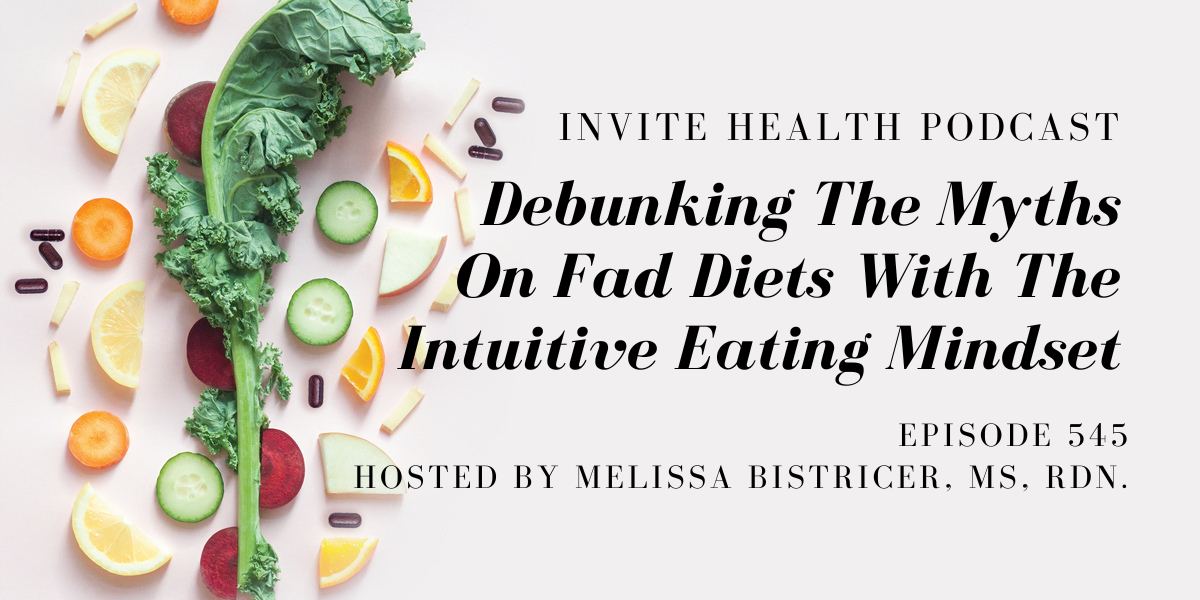intuitive eating
Subscribe Today!
Please see below for a complete transcript of this episode.
Debunking The Myths On Fad Diets With The Intuitive Eating Mindset – InViteⓇ Health Podcast, Episode 545
Hosted by Melissa Bistricer, MS, RDN
*Intro music*
InViteⓇ Health Podcast Intro: Welcome to the InViteⓇ Health Podcast, where our degreed healthcare professionals are excited to offer you the most important health and wellness information you need to make informed choices about your health. You can learn more about the products discussed in each of these episodes and all that InViteⓇ Health has to offer at www.invitehealth.com/podcast. First time customers can use promo code PODCAST at checkout for an additional 15% off your first purchase. Let’s get started! †
*Intro music*
Melissa Bistricer, MS, RDN: [00:00:39] Welcome to another podcast at InViteⓇ health. Today we’ll be talking about the importance of following a healthy, balanced diet, debunking the myth of all these fad diets. My name is Melissa Bistricer and I am a registered dietitian. I’m so excited to bring to you the nutritional aspect of nutrients here and InViteⓇ Health. Nutrition, food for thought: Our food needs to be our fuel, not our comfort or an addiction. † [00:01:03]
[00:01:04] InViteⓇ health, promotes an integrative approach providing vitamins into our daily life to increase your quality of life. In conjunction with nutrients it is also important to learn and include other lifestyle modifications like nutrition, exercise and sleep. These practices with the use of vitamins will promote optimal benefit in your daily life. † [00:01:23]
[00:01:24] A healthy diet is a balanced diet. All these fad diets you’ve been on promised you that you’re going to lose weight and be successful. The programs have you thinking that you’ll lose x amount of weight from the whole-30 to ketogenic to paleo. The reality is that yes, you will lose the weight, but the minute you decide to go off you will gain the weight back and even more. What is the benefit in doing that? The truth is, no one can uphold the restrictions in the diets. Likely you’ll end up falling and binge eating the foods that were restricted, which again result in you gaining back the weight and even more. † [00:01:59]
[00:02:00] Let’s discuss and get into details of how you can live a happier, healthier life with no restrictive diets haunting you. This way you can enjoy, look, and feel your best. The approach I like to use with clients, customers or patients is the intuitive eating mindset. This is simply terms is a non dieting approach to change eating habits. According to the National Eating Disorder Association intuitive eating is just trusting your body to make food choices that feel good to you without judging yourself or the influence of diet culture. To learn this process can be scary and haunting, but the correct tools and guidance you will feel like a million bucks for the rest of your life.† [00:02:42]
[00:02:43] A couple of tips to start off with in the intuitive eating mindset, which can be hard to do, but over time, working through it will definitely be worth it. The most important is to completely reject diet mentality, come to terms that dieting will not get you where you want to be. It will just get you embarrassment, frustration, and even exhaustion. Then we need to allow our brains to recognize our hunger cues. There is something called the Hunger Fullness Cue Chart, which helps us put into perspective and recognize when we are starving, hungry, satisfied or overstuffed, then we need to be able to make peace with food. Meaning no food is off limits. We just need to be able to feel our fullness rather than eating straight from the top of ice cream and mindlessly eating until you reach the bottom of the container. Or like, wait, what happened to all the ice cream? Did I really finish it? Does that even satisfy me? Rather than taking a bowl with a few scoops of ice cream and being aware of your fullness, maybe one bowl will satisfy you. Maybe two much just being mindful and aware that it is important in this journey. Remember? Another important factor is to challenge the food police. Who has the right to put food in a good or bad category? Don’t let the feelings of fear or guilt get too you because there is no such thing as a good or bad food. This is why, in intuitive eating we aren’t following a specific diet plan. There is a component of discovering the satisfaction of food. We don’t want to eat on the go in the car or being rushed. We want to enjoy our food. There are studies to prove that those who eat while doing something else will eat more. † [00:04:19]
SUPERFOOD BENEFITS FOR ADEQUATE NUTRITION & BEYOND – INVITE HEALTH PODCAST, EPISODE 63 >> Listen Now!
[00:04:20] Learn to cope with the emotions by not using food when you feel overwhelmed, stressed, sad, bored or even lonely. Do not turn to food finding something else to help lift your mood to deal with the emotions. This can be through meditation, like yoga, you can run or even walk. Exercise can also help to make you feel better, but not focusing on the amount of calories burning. Rather how it makes you feel. Choose an exercise you’re going to enjoy. And this is not going to be focused on calories that you are burning so you can enjoy rather than forcing herself to do something you do not enjoy. One of the other things of intuitive eating is to not focus on calories, carbs or fats in different foods. Oftentimes, I see individuals who are consistent dieters who have memorized specific foods that are high in calories, carbs or fats. They tend to forget about the foods that they actually enjoy eating. The idea is to start to focus on foods you enjoy to eat that will help satisfy you. † [00:05:24]
[00:05:26] Unconditional permission to eat – you may think that means to go eat pizza and candy at all times while it is. But the truth is, is that once you allow yourself to enjoy the food, the less your brain will actually desire it. The foods that have. Being restricted are no longer off limits now. Therefore, you’re able to eat them whenever you want. The cravings will be less frequent or intense and more likely to feel in control when the foods are around. Once you’re able to listen and learn what is best for your body and learn what makes you feel best, you might find yourself eventually reaching for nutrient dense options rather than the pizza or the candy. Remember that just because you fall one day and eat poorly doesn’t define you. It does not mean you have failed and tomorrow you will continue to eat poorly. The idea is, is that eating healthy long term is what matters. One day of mistakes will not affect you as it is what happens on most days that matters the most. † [00:06:20]
[00:06:20] It is important to not get confused between fad diets and a healthy lifestyle modification. When I say that following a Mediterranean diet can be beneficial for reducing inflammation, improve blood vessel function, and reduce the risk of metabolic syndrome and diabetes. This is not limiting the foods you are eating but is reducing risk factors. My recommendations for specific diseases or conditions may correlate with specific lifestyle modifications. Intuitive eating is a process to dig deep and to learn about that carbs, protein and fat are not the enemy. There are three main sources of nutrients in our body that we need to survive. Now let’s talk about why they are so important and necessary to eat in our daily life. † [00:07:03]\

[00:07:04] Carbs is our main source of energy. They are not the enemy. Eat them. Your body needs them. Oh, yes, I did say that. Go out and eat carbs. But keep in mind to listen to your hunger, fullness cues. Carbs provide the body with glucose which is converted to energy to use to support bodily functions and physical activity. Fun fact, about glucose, it comes from the: Greek word sweet, which is a type of sugar from foods that you eat that the body uses for energy either right away or it stores the glucose for later. It travels throughout the bloodstream to your cells called blood glucose or blood sugar. Insulin is a hormone involved that moves glucose from the blood to the cells for energy and storage. A dietician at the University of Texas Medical School of Houston states that carbs are important for energy providing vitamins and minerals, but not all carbs are created equally. According to the US Department of Agriculture, the USDA states that the best Carb sources are those that contain a lot of fiber. For example, those are in vegetables, fruits and whole grains. These types of carbs generally take longer for the body to process and break down, therefore taking longer to break down into glucose and providing more nutrients. Refined carbs are sometimes considered as “bad” carbs, which is incorrect as there’s no such thing as good or bad carbs. Refined carbs are just processed and have been removed of part the grain, and sometimes have additional added sugar. This can be eaten with consideration but still can be eaten as all carbs provide energy to the body and break down into glucose. The general rule of thumb with carb sources are fruits, starchy vegetables, milk, starches or grains. Just remember to listen to your hunger, fullness cues, to be aware and listen to your body as a guide. It is important to remember that carbs are our energy source. † [00:09:00]
FEELING ENERGIZED AGAIN WITH THE ANTI-FATIGUE PROGRAM >> Read Now!
[00:09:01] Protein is in every single part of our bodies. The basic structure of protein is a chain of amino acids. Amino acids are building blocks due to them being attached to long chain. They are macronutrients in the body which are needed in large amounts to stay healthy. The most important function of protein is to help the body repair cells and make new cells. Consuming protein daily is extremely important as it plays a role in keeping the cells in good shape and protein cannot be stored in the body. Protein is not able to be stored in the body. Therefore, when the needs are met, any extra protein is used for energy or stored as fats. Too much protein can lead to the protein becoming stored as fat. Therefore, leading leading to weight gain over time and generally can result in consuming excess calories from protein intake. † [00:09:53]
[00:09:54] There are five reasons why getting enough protein is super beneficial to the body: One Build protein is an important building block in bones, muscles, cartilage and skin. In fact, it helps with as well as it’s made mostly up of protein. Two repair your body uses protein to build and repair tissue. Three oxygenate red blood cells are contained in proteins and carry oxygen throughout the body. This can help to supply the body with nutrients needed to survive. Four digest half of our dietary protein is consumed daily in order to make enzymes which aid in digestion of food. This can help to make new cells and body chemicals. Five regulate protein plays a role in hormone regulation during the transformation and development of cells during puberty, specifically. † [00:10:45]
[00:10:46] Protein is important in the body to get every single day. The amount differs based on physical well-being and lifestyle. An individual who works out may need more protein to recover from the intensity of the physical activity. They need protein to help repair and strengthen muscle tissues in the body. For individuals who are critically ill, they may need increased protein to help reduce infectious complications, improve muscle mass and quick rates of recovery. The most important role of protein, again, is to help the body repair cells and make new cells. † [00:11:19]
[00:11:20] Lastly, fats in small amounts are essential for a healthy, balanced diet. The body does need dietary fat for energy and to help support cellular function. Fats will also protect your organs and keep you warm, as well as help to absorb nutrients and produce important hormones. There are several types of fat, such as saturated, trans-monounsaturated, polyunsaturated fats. Among these four types of fats, they all have different chemical structures and physical properties. The so called “bad” fats are the saturated and trans-fats. And this is because they will harden in your arteries potentially leading to risk factors such as heart conditions. Monounsaturated and polyunsaturated fats are better choices as they are liquid at room temperature, like canola oil. † [00:12:06]
[00:12:07] Fats do have a different effects on cholesterol levels in the body. A diet high in saturated fats will increase the LDL cholesterol, which is defined as the bad cholesterol levels in the blood. Having fats such as mono or polyunsaturated fats can reduce the bad cholesterol levels. When we want to be aware of the types of fats we are consuming. We want to consume essential fatty acids which the body cannot naturally produce and can be gotten through food or supplementation. Anther role of fat is to help the body absorb vitamins such as A, D, E and K. They are all known as the fat soluble vitamins, which means they need fat in order to be absorbed properly in the body. Dietary fat is important in the body to give the body energy and to support cell function. Fats will also help to protect the organs and help keep your body warm. The fat will help absorb some nutrients and produce important hormones in the body. Eating fat is definitely part of a healthy diet. Though choosing the healthier fats like avocados, fatty fish like salmon, nuts, seeds or dark chocolate would be a better option.† [00:13:16]
[00:13:17] Do not forget that a healthy, balanced diet is supposed to include the foods that you love as well. Just keep a balance of portion sizes, listen to hunger cues, and choose to emphasize an overall eating healthily as a long term goal. † [00:13:31]
[00:13:32] For further questions, you could always chat with me as a nutritionist or any of our health care providers to assist you here at InViteⓇ health or email me at [email protected] that’s [email protected] I am Melissa Bistricer, RDN ready to share the knowledge to help you modify your lifestyle to live a happier, more successful life. I’m looking forward to continuing to provide you with educational podcast and blog post. Again nutrition, food for thought: our food needs to be our fuel, not our comfort or an addiction. Have a great day and tune in for the next podcast coming your way soon. † [00:13:32]
*Exit music*



